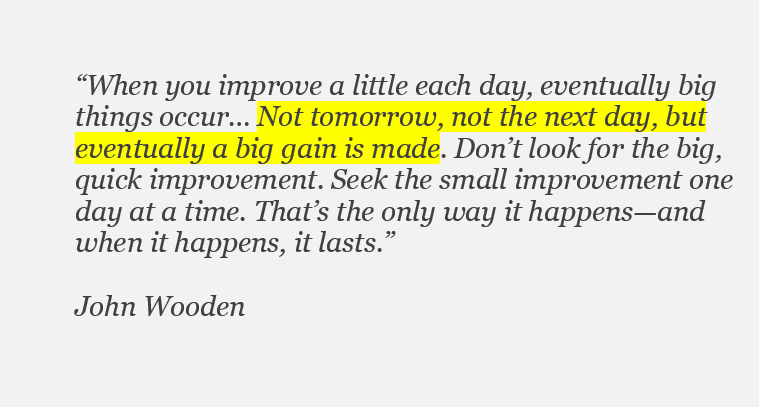
“Here we go again,” you mutter under your breath.
It has been three days since you last went to the gym. For a few weeks you were hammering out workouts, eating like a total boss, and making lifestyle choices that were congruent with your goals.
But now, after a few days of missed workouts, of blown food choices, you can feel the hard work slipping away like sand through your fingers.
With Dorito crumbs sprinkled across your shirt, legs kicked up, and a half-eaten pizza holstered at your side you settle in for another night of watching television, feeling like crap about not going to the gym, but screw it, ya know?
If this feeling is familiar, it’s because it is.
This is the umpteenth time that you tried to inflict long-lasting change. Each attempt a mirror of the previous, an impassioned flurry of effort and commitment before inevitably sliding off.
You wallow. Slide further. Until the moment—a few days, weeks, years later—where you meekly tell yourself, “This time will be different.”
Why Do We Fall Off?
Before we jump gung-ho, brimming with fire and hunger, into another round of trying to crush our goals in the gym it is helpful to understand why you face-planted in the first place.
The main culprit of why we fall off is because we are prey to an “all-or-nothing” attitude. It’s a mindset that is completely unforgiving of screw-ups, of missed workouts, of setbacks.
Slipping up, falling down—both are human nature. The best of us with the best of intentions screw up and fall off. We know but don’t understand that perfection is unrealistic. And yet we continue to allow it to be the arbitrator of our goals and commitment.
All-or-nothing thinking:
- Creates hilariously unrealistic expectations.
- Doesn’t allow room (or forgiveness) of slip-ups.
- Causes us to think in extremes; we are either winners or losers.
- If you miss a workout then you are a slacker or lazy.
- If you come up short on today’s rep ranges than you are weak.
- Glosses over the small wins and improvements that happen. Fixation on the major “losses.”
- Attaches your performance to your feelings of self-worth. A bad workout means you are a crappy person.
Stumbling isn’t an indictment of you or your goals. It’s not a reflection of who you are as a person. And it’s something that happens to every-single-body.
Understanding this is the first and essential step in getting back on track, otherwise we are just gonna end up circling right back to this exact spot.
- See Also: The Ultimate List of Workout Routines. Our ever-growing collection of workouts and routines from some of the top trainers and strength coaches on the planet. Whether you are an athlete, weekend warrior, or just looking to switch things up in the gym, we got ya covered.
How to Get Back on Track
Understanding that “all or nothing” creates unrealistic expectations, how do we go about setting ourselves up so that we can get back on track in the gym?
Here are a few ideas that have worked for me in the past:
Start with no expectations.
If you’re like me, you’re wildly ambitious with your goals. We make a decision on a Monday morning and by Monday afternoon we expect to see some results, goddamnit.
Experience and common sense tells us that this isn’t the way it works, and yet we still go on insisting that sudden decisions should produce overnight results.
Tempering expectations means you are less attached to the outcome, which removes that fear you won’t be able to achieve it in such-and-such a time.
Additionally, expectations put you in a position where you are always looking ahead. When you remove them, it forces you to react to today. To focus and appreciate today’s battle and no further. Dropping expectations keeps your focus on the importance of the routine versus the goal.
Chase small, daily improvements.
Sometimes violent change is thrust upon us, sending us hurtling into a new direction. But when we dictate terms it’s important to take it slow. Why? Because upsetting our bubble, our boundaries and current habits and behaviors on purpose is difficult.

Strive to achieve a small win each day, and view your goals in the gym as a “work in progress” and not as a final result.
The good news is that the small win doesn’t have to be earth-shaking for it to have a profound and motivating impact.
Have a clear starting point.
Vague, open-ended goals are workout killers.
“I want to get in shape.”
Well, that’s nice—what’s the first step? Have a very clear Point A, something you can grasp.
Ambiguity and haziness is a knockout 1-2 for your goals and keeps you in a state where you are continually looking to the future for that non-existent moment when the stars will align for when you “totally feel like it.”
Start out differently.
It’s likely that this is not the first time you have fallen off track. So what’s up? Why are you having a hard time making this a consistent thing?
Learn the lessons of your past slip-ups in order to create an environment that is better suited to the things you want to accomplish.
It’s not that you need more willpower or motivation, it’s that you need to make your goal easier to accomplish, whether that is doing things like laying your workout clothes the night before your morning run, or doing some “if-then” planning to help instill the workout habit.
Dial back the pace.
I understand the temptation to go nuts when you are getting back into the swing of things. Making a complete commitment might signal change, but in order to truly inflict change you gotta work at a pace that is sustainable.
After all, would you rather be the gym-goer that goes to the gym three times a week for life, or the one that goes 7 days a week for three fiery weeks a year and crashes and burns?
The goal is consistency above all else.
Keep it simple.
Having one goal is good, so having a whole bunch of goals must be great, right? Wrong.
Complexity is not your friend. Having a list of 20 different goals might encourage a feeling of ambition, but they’ll only compete against one another for your valuable time and energy.
Focusing on a couple things doesn’t make you “less-than” other high achievers. When you keep things simple you narrow your focus instead of watering down your effort across a spectrum of different goals.
Ease into the tough days.
Okay, so despite our best intentions we both know that there are going to be rough days. Where you are feeling run down, exhausted, and the last thing you want to do is go to the gym.
My trick for dealing with these days?
Easing into it.
Sometimes this means promising myself that I will warm-up and see how I am feeling after that, or if my workout calls for high intensity work start out with some mid-intensity sets.
In both cases, I am lowering the bar of entry.
In other words, don’t make the start so intimidating that it requires you to be fully motivated to start.
Make starting accessible on days when you are totally inspired, but especially for the days when your motivation is running on fumes.
Stop planning and start doing.
Something interesting happens when you take that first meaningful step. This is usually because we build up our goals as these big insurmountable mountains, so that when we begin to act we float with a sense of progress.
The simple act of starting also gives you the feeling of being in control, something that cannot be understated. Even if it is not a huge step, we experience a shade of forward momentum that tends to propel us into the second step.
Expect resistance.
Even if you do the above things, you will still experience push-back. And this is fine. Managing your expectations is crucial in this respect as well; be willing to brave the friction that comes with implementing meaningful change.
Make winning the battle against the friction the goal and the rest is fait acompli.
Putting it all together:
Feeling like you are perpetually starting over blows. Over and over, around and around we go, always taking a swing at making change but never able to make it happen.
I get it.
It leaves the lasting impression within us that we aren’t deserving of the things we want to achieve in the gym (and in life), it sows serious doubt in our ability to follow-through, and it’s a bit embarrassing having to try again and again to make something as simple as working out a regular fixture in our lives.
But it doesn’t have to be this way.
Try some of the above tricks. They might seem simple and easy to dismiss, but more often then not it’s the simple things that work best.